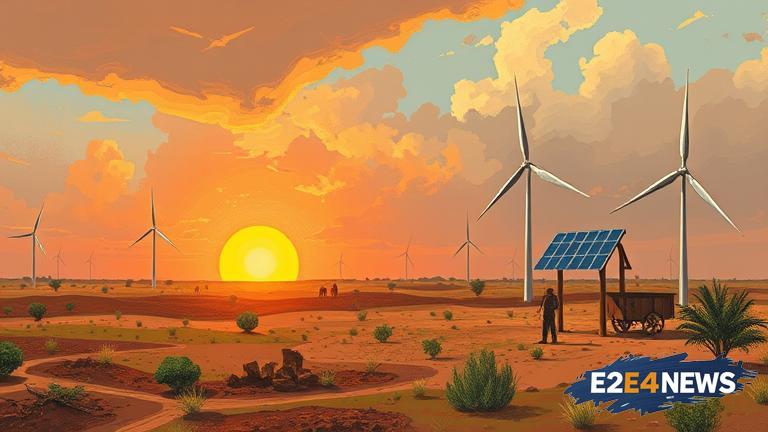The African continent is witnessing a significant shift towards renewable energy, driven by the need to address the pressing issues of energy access, climate change, and sustainable development. With a growing population and increasing economic activities, the demand for energy is on the rise, and renewable energy sources such as solar, wind, and hydroelectric power are becoming increasingly attractive. Many African countries are now investing heavily in renewable energy infrastructure, with a focus on solar and wind power. For instance, South Africa has set a target of generating 42% of its electricity from renewable sources by 2030, while Morocco aims to increase its renewable energy capacity to 52% by 2030. Egypt, on the other hand, has launched several large-scale renewable energy projects, including a 1.8 GW solar park in the Aswan province. The use of renewable energy is not only helping to reduce greenhouse gas emissions but also creating new job opportunities and stimulating local economies. In addition, renewable energy is becoming more competitive with fossil fuels, making it a viable option for many African countries. The cost of renewable energy technologies such as solar panels and wind turbines has decreased significantly over the years, making them more accessible to African countries. Furthermore, the African Union’s Agenda 2063 has set a target of ensuring that at least 50% of the continent’s energy mix comes from renewable sources by 2030. To achieve this goal, African countries are working together to develop regional renewable energy projects and share best practices. The African Development Bank has also launched several initiatives to support the development of renewable energy in Africa, including the creation of a $500 million fund to support renewable energy projects. Moreover, international organizations such as the International Renewable Energy Agency (IRENA) are providing technical assistance and capacity-building programs to help African countries develop their renewable energy sectors. The private sector is also playing a crucial role in the development of renewable energy in Africa, with many companies investing in large-scale renewable energy projects. For example, the Norwegian company Scatec Solar has invested in several solar power projects in Africa, including a 400 MW solar park in Egypt. Similarly, the Chinese company Trina Solar has invested in several solar power projects in Africa, including a 100 MW solar park in South Africa. The growth of renewable energy in Africa is also driven by the need to address energy poverty, which affects millions of people across the continent. Renewable energy can provide energy access to off-grid communities, improving their livelihoods and contributing to sustainable development. In conclusion, the renewable energy revolution in Africa is gaining momentum, driven by the need to address energy access, climate change, and sustainable development. With the support of international organizations, the private sector, and governments, Africa is poised to become a leader in the global renewable energy market. The continent’s renewable energy potential is vast, and with the right policies and investments, Africa can unlock its full potential and achieve a sustainable energy future. The use of renewable energy can also help to reduce the continent’s dependence on fossil fuels, which are a major contributor to climate change. Furthermore, renewable energy can help to improve energy security, reduce energy costs, and stimulate economic growth. As the demand for energy continues to grow, African countries must prioritize the development of renewable energy to ensure a sustainable energy future. The benefits of renewable energy are numerous, and African countries must work together to unlock its full potential. With the right policies and investments, Africa can become a leader in the global renewable energy market, reducing its dependence on fossil fuels and mitigating climate change.
